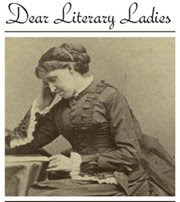
Dear Literary Ladies.
It's always fascinating to discover how those of you who succeeded so brilliantly went about the basics of the practice of writing. Can you share some quick insights on how you developed plots and characters?
My methods of work are very simple & soon told. My head is my study, & there I keep the various plans of stories for years some times, letting them grow as they will till I am ready to put them on paper. Then it is quick work, as chapters go down word for word as they stand in my mind . . . I never copy, since I find by experience that the work I spend the least time upon is best liked by critics & readers.
While a story is under way I lie in it, see the people, more plainly than the real ones, round me, hear them talk, & am much interested, surprised, or provoked at their actions, for I seem to have no power to rule them, & can simply record their experiences & performances.
— Louisa May Alcott, from a letter, 1887
Any quick tips for plot and character development?
Help! I need to hear a good rejection story!

Dear Literary Ladies,
A book that I've toiled on and believe in with all my heart has been rejected by more than a dozen publishers. Am I delusional? Maybe it's no good after all. I need to hear a great story of a book that was rejected over and over but then became a smash success. Who among you has such a story for me today?
A Wrinkle in Time was almost never published. You can’t name a major publisher who didn’t reject it. And there were many reasons. One was that it was supposedly too hard for children. Well, my children were 7, 10, and 12 while I was writing it. I’d read to them at night what I’d written during the day, and they’d say, “Ooh, mother, go back to the typewriter!” A Wrinkle in Time had a female protagonist in a science fiction book, and that wasn’t done. And it dealt with evil and things that you don’t find, or didn’t at that time, in children’s books. When we’d run through forty-odd publishers, my agent sent it back. We gave up. Then my mother was visiting for Christmas, and I gave her a tea party for some of her old friends. One of them happened to belong to a small writing group run by John Farrar, of Farrar, Straus & Giroux, which at that time did not have a juvenile list. She insisted that I meet John any how, and I went down with my battered manuscript. John had read my first novel and liked it, and read this book and loved it. That’s how it happened.
— Madeleine L'Engle (1918-2007)
[A note from Nava: A Wrinkle in Time went on to sell millions of copies, and has won numerous awards. It also has the distinction of being one of the most banned books of all time. Madeleine L'Engle likely paved the way for authors of juvenile and young adult literature to be able to deal with darker themes—the Harry Potter series being just one example.]
Are women authors held to different standards than men?

Dear Literary Ladies,
Not one of the top ten books of 2009 according to Publishers Weekly was by a female writer, and only about a third of the books on their extended best book lists were by women. Do you think women writers are (or should be) judged by different standards than men?
To value praise or stand in awe of blame we must respect the source whence the praise and blame proceed, and I do not respect an inconsistent critic. He says, “if Jane Eyre be the production of a woman, she must be a woman unsexed.’
In that case the book is an unredeemed error and should be unreservedly condemned. Jane Eyre is a woman’s autobiography, by a woman it is professedly written. If it is written as no woman would write, condemn it with spirit and decision—say it is bad, but do not eulogise and then detract. I am reminded of The Economist. The literary critic of that paper praised the book if written by a man, and pronounced it ‘odious’ if the work of a woman.
To such critics I would say, ‘To you I am neither man nor woman—I come before you as an author only. It is the sole standard by which you have a right to judge me—the sole ground on which I accept your judgment.’
—Charlotte Brönte, from a letter, August 16, 1849



